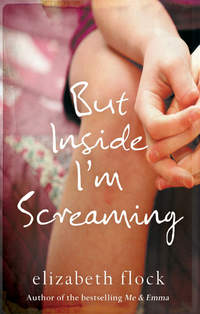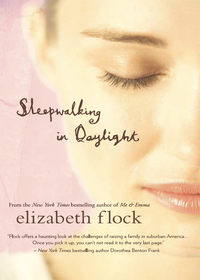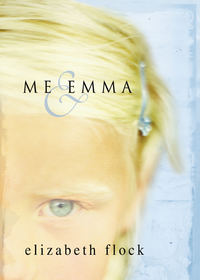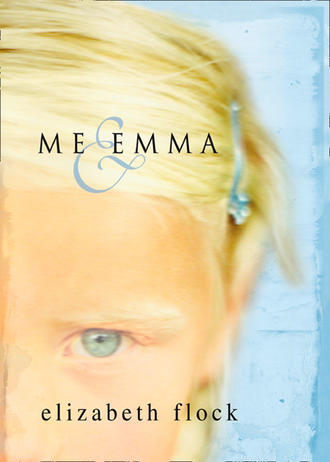
Полная версия
Me & Emma

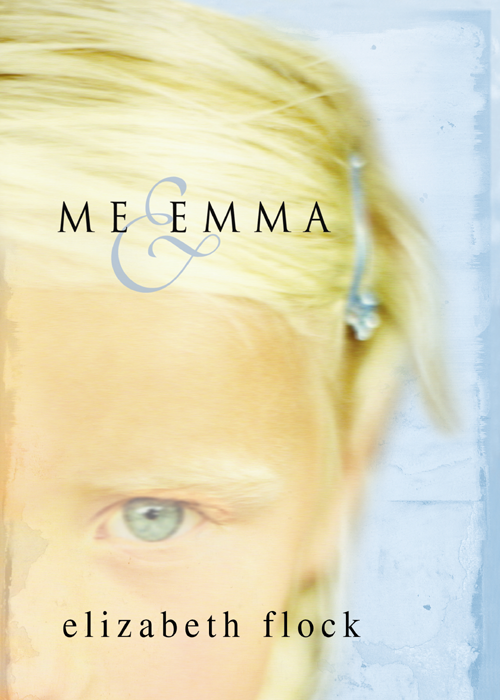
Me & Emma
Elizabeth Flock

www.mirabooks.co.uk
FOR MY PARENTS—BARBARA AND REG BRACK
“Nothing is sinful to us outside of ourselves,
Whatever appears, whatever does not appear, we are
beautiful or sinful in ourselves only.
(O Mother—O Sisters dear!
If we are lost, no victor else has destroy’d us,
It is by ourselves we go down to eternal night.)”
—Walt Whitman, Leaves of Grass, 1900
ACKNOWLEDGMENTS

Many people helped breathe life into this book. My deep gratitude to Anne and Taylor Pace, who shared their beloved North Carolina with me and watched patiently while it became my beloved North Carolina.
My thanks also to my gifted editor, Susan Pezzack, and to my tireless agent, Laura Dail, who still has no idea that her encouragement is completely intoxicating.
I am blessed to have a friend like Mary Jane Clark, who is a constant source of strength and love.
My Emily gave me Carrie’s voice and helped me remember what it’s like to be a little girl. My Lizzie gave me support and unknowingly saved me from myself time and time again. And my Jeffrey gave me this whole new wonderful life and with unwavering support and love made it possible for me to be a writer.
ONE

The first time Richard hit me I saw stars in front of my eyes just like they do in cartoons. It was just a backhand, though—not like when I saw Tommy Bucksmith’s dad wallop him so hard that when he hit the pavement his head actually bounced. I s’pose Richard didn’t know about the flips I used to do with Daddy where you face each other and while you’re holding on to your daddy’s hands you climb up his legs to right above the knees and then push off, through the triangle that your arms make with his. It’s super fun. I was just trying to show Richard how it works. Anyway, I learned then and there to stay clear of Richard. I try to stay away from home as much as I possibly can.
It’s impossible to get lost in a town called Toast. That’s where I live: Toast, North Carolina. I don’t know how it is anywhere else but here all the streets are named for what’s on them. There’s Post Office Road and Front Street, which takes you past the front of the stores, and Back Street, which is one street over—in back of them. There’s New Church Road, even though the church that sits at the end of it isn’t new anymore. There’s Brown’s Farm Road, which is where Hollis Brown lives with his family, and before him came other Browns who Momma knew and didn’t like all that much, and Hilltop Road and even Riverbend Road. So wherever you set out for, the street signs will lead the way. I live on Murray Mill Road, and I s’pose if you didn’t know any better you’d think my last name’s Murray, but it’s Parker—Mr. Murray passed on way before we got here. We didn’t change a thing about the Murray house: the way in from Route 74 is just grass growing up between two straight lines so your tires’ll know exactly where to go. The first thing you see after you’ve been driving till the count of sixty is the mill barn that’s being held up over the pond by old stilts. We still have the board with peeling painted letters that says No Fishing on Sunday nailed up to the tree on the edge of the pond. Just to the side of that, taking up a whole outside wall of the mill, is Mr. Murray’s old sign that shows a cartoon rooster cock-a-doodle-doing the words Feed Nutrena … Be Sure, Be Safe, Be Thrifty. It’s getting hard to read the words of the poster now that a fine red dust from the dirt outside the mill has settled over it top to bottom. But you can see the rooster clear as day. Tacked up to the door of the old mill is this: “WARNING: It is unlawful for any person to sell, deliver, or hold or offer for sale any adulterated or misbranded grain. Maximum penalty $100 fine or 60 days imprisonment or both.” I copied that down in my notebook from school.
“Whoa!” The notebook goes flying out of my hands into the dirt.
“Betcha didn’t see that coming!” Richard laughs at me as I scramble to pick it up before he gets ahold of it. “Must be something pretty important, you grabbing at it like that. Lemme see there,” and he pulls it out of my hands before I can make a squeak about it.
“Give it back.”
“‘Collie McGrath isn’t talking to me on account of the frog incident’ … what’s the frog incident?” He looks up from my diary.
“Give it back!” But when I go to try to get it back he shoves me away, flipping through the pages, scanning each one with his dirty finger. “Where am I? I can’t wait to see what all you write about me. Hmm,” more flipping, “Momma this, Momma that. Jesus H. Christ, nothing about your dear ole dad?”
He throws it back down to the ground and I’m mad I didn’t listen to my own self when I thought I shouldn’t reach down to pick it up until he leaves, ‘cause when I do bend down again he shoves me into the dirt with his boot.
“There! Gave ya something to write about!”
I live here with my stepfather, Richard, my momma, and my sister, Emma. Emma and I are like Snow White and Rose Red. That’s probably why it’s our favorite bedtime story. It’s about two sisters: one has really white skin and yellow hair (just like Momma) and the other one has darker skin and hair that’s the color of the center of your eye (that’s just like me). My hair changes colors depending on where you’re standing and when. From the side in the daytime, my hair looks purple-black, but from the back at night it’s like burned wood in the fireplace. When it’s clean, Emma’s hair is the color of a cotton ball: white, white, white. But usually it’s so dirty it looks like the dusty old letters Momma keeps in a shoe box on her closet shelf.
Richard. Now there’s a guy who isn’t like anyone we’ve read about at bedtime. Momma says he’s as different from Daddy as a cow from a crow, and I believe her. I mean, wouldn’t you have to be likable to make everyone line up to buy carpet from you like Momma says they did for Daddy? Richard’s not half as likable. I told Momma once that I thought Richard was hateable, but she didn’t think it was funny so she sent me to my room. A few days later, when Richard was back picking on Momma she yelled out that no one liked him and that his own stepdaughter called him “hateable.” When she said it I just stood there listening to the tick-tick-tick of the plastic daisy clock we have hanging in the kitchen, knowing it was too late to run.
Momma says our daddy was the best carpet salesman in the state of North Carolina. He must’ve sold a ton of carpet because there wasn’t any left for us. We have hard linoleum. After he died Momma let me keep the leaf-green sample of shag that she found in the back seat of his car when she was cleaning it out before Mr. Dingle took it away. The sample must’ve fallen off the big piece of cardboard that had lots of other squares on it in different colors so folks could match it to their lives better. I keep it in the drawer of the white wicker night table by my bed in an old cigar box that has lots of colorful stickers of old-fashioned suitcases, stamps and airplanes (only on the cigar box they’re spelled aeroplanes) slapped on every which way. Sometimes if I sniff into that shag square real hard I can still pick up that new carpet smell that followed Daddy around like a shadow.
Back to me and Emma. Our hair is different colors but our skin is where you see the biggest difference. Chocolate and vanilla difference. Emma looks like someone got bored painting her and just left her blank for someone else to fill in. Me? Well, Miss Mary at White’s Drugstore always tilts her head to the side and says, “You look tired, chile,” when she sees me, but I’m not—it’s just the shadows under my eyes.
I’m eight—two years older than Emma, but because I’m small people probably think we’re mismatched twins. And that’s the way we think of each other. But I wish I could be more like Emma. I scream when I see a cicada, but Emma doesn’t mind them. She scoops them up and puts them outside. I tell her she should just step on them but she doesn’t listen to me. And she never gets picked on by the other kids. Once, Tommy Bucksmith twisted her arm around her back and held it there for a long time (“until you say I’m the best in the universe” he told her at the time, laughing while he winched her arm backward higher and higher) and she didn’t make a peep. Emma’s not scared of anything. Except for when Richard turns on Momma. Then we both go straight to behind-the-couch. Behind-the-couch is like another room for me and Emma. It’s our fort. Anyway, we usually head there when we’ve counted ten squeaks from the foot pedal of the metal trash can in the kitchen. The bottles clank so loud I think my head’ll split in two.
Richard starts bugging Momma after about the tenth squeak. I don’t know why Momma doesn’t stay out of his way from squeak eight on but she doesn’t. Me and Emma, we’ve started a thing we call the floor shimmy where, when we hear squeak eight we start to scoot our behinds real slow from the floor in front of the TV toward behind-the-couch. With the volume up you can’t hear us, and Richard’s concentrating real hard on Momma so he doesn’t notice that we’re inching toward behind-the-couch. By squeak nine, we’re about two Barbie-doll lengths from the front of the couch, and just before squeak ten we’re sliding between the cool paint on the wall and the nubby brown plaid back of the couch. We used to think it was stinky behind-the-couch, but we don’t even notice it anymore. I brought some of Momma’s perfume there once and squirted it twice right into the fabric so now it smells just like Momma on Sunday.
We live in an old white house with chipping yellow shutters. It’s three floors high, if you count the attic where me and Emma sleep. We used to have our own room across the hall from Momma and Daddy’s room, but after he died and Richard moved in we had to go up another floor. But here’s the worst part: Richard’s making us move. I cain’t even think about that right now. When I don’t want to think about something I just pretend there’s a little man in my head who takes the part of my brain that’s thinking the bad thing and pushes on it real hard so it goes to the back of all the other things I could be thinking about.
Momma says it’s trashy to have stuff out front of our house like we do so she goes and plants flowers in some of it so it’ll look like we’ve got it there on purpose. Here’s what we’ve got: three tires—one of them has grass already growing from the pile of dirt that’s in the middle of it; a cat statue that’s gray like a sidewalk; Richard’s old car that he says will come back to life one of these days, but when it does I think it’ll be confused since it doesn’t have any tires on it; Momma’s old tin washtub with flowers planted in it; a hammock Emma and me liked to swing in when we were really young, but now one side’s all frayed because we never took it inside in the winter; a bale of hay that smells bad on account of rain rot; a metal rooster that points in the direction of a storm if one’s coming; and Richard’s old work boots. Momma up and planted flowers in them, too. I’ve never seen flowers in boots before, but she did it and sure enough there’re daisies pushing up out of them right this minute. Oh, I almost forgot, Momma’s clothesline is out there, too.
We don’t have a front walk to get to the door to the house. I wish we did. Snow White and Rose Red have a front walk that takes you through an archway of roses. We just have grass that’s been walked on so much it’s dirt. But then you get to the front porch and that’s the part I like best. It makes a lot of noise when you walk on it but I like being able to look out over everything.
“What’re you doing?” Emma asks. Where she came from I don’t know. I didn’t even hear her.
I’m standing here on the front porch, surveying our yard and all the things we’ve got. Sometimes I pretend I’m a princess and that instead of things they’re people, my subjects waving up to me on the balcony of my castle.
“What do you mean what am I doing?”
“Who’re you waving at?”
“I wasn’t waving.”
“Were, too. You’re pretending you’re a princess again, aren’t you?” Emma sits in Momma’s old rocker that’s missing most of the seat. She’s smiling ‘cause she knows she nailed me.
“Was not.”
“Was to. What color dress you wearing?” I can tell by the tone in her voice because she isn’t making fun of me anymore, she just wants to hear me talk my dream out loud so she can dream it, too. She’s all serious now.
“It’s pink, of course,” I say, “and it’s got sparkly beads sewn all over it so it looks like the dress is made of pink diamonds. And I have a big ole lace collar that’s made by hand. It’s not scratchy at all. In fact it’s so soft it tickles me sometimes. The sleeves are velvet, white velvet. They’re even softer than the lace. But the best part is my shoes. My shoes are made of glass, just like Cinderella’s, and they have diamonds on the tips so they can match my dress.”
Emma’s eyes are closed but she’s nodding.
“And here are my loyal subjects.” I sweep my arm across the railing toward the yard. “They all love me because I’m a good princess, not a mean one like my stepsister. I give them food and money—and I talk to them like they’re in my family. My loyal subjects …” I say this last part to all the stuff in the yard. Oh, yeah, we also have an old iron bed out there. It’s rusted now but it used to be bright metal. It’s right up front so I pretend it’s the river of water that runs in a circle around my castle and that the front steps are a drawbridge. I wish the drawbridge could stay up and keep Richard from coming into the castle.
Uh-oh. Richard’s noisy truck is pulling into its parking space to the side of the house. I cain’t tell for sure but it looks like he might not be in too bad a mood right now. I’m keeping my fingers crossed on that one.
“Whatchoo up to on this fine North Carolina day?” He’s walking toward us, but I can tell by his speed that he isn’t interested in our answer.
“Nothing,” Emma and I say at the same time, both of us backing up to put more space between us and him. Just in case.
“Nothing,” Richard mimics us with his chin sticking out extra far. But he keeps on walking past us into the house. “Libby? Where you at?” I hear him call to Momma once the porch door slams behind him. “It’s payday and I’m in need of in-ee-bree-ation!” A second later I hear vacuumed air pop from a bottle and then the sound of a tin cap pinging onto the counter in the kitchen. Momma’s voice is murmuring something I can’t make out.

“Hey, Pea Pop, how’d you like a nice cold orangeade?” Daddy rustled my hair like I was a pet dog. “Lib? It’s payday! Getchur bag, we’re going shopping.”
Payday was always the best day of the month when Daddy was alive. I’d hear orangeade and it was all I could do to fit the tiny metal fork into the hole in the strap on my sandals, I’d be so excited.
“Can I get a large, Daddy?” I called out from the back seat, loud enough to be heard over the wind blowing in through all the open windows in our car.
“You can get a jumbo, pea.” He smiled, and caught my eye in the rearview mirror.
Our first stop was the grocery store. Momma pulled a cart from the stack all folded into one another by the glass entrance. The cold air gave me gooseflesh at first but by aisle two I was used to it.
“Stop swinging your feet, Caroline,” Momma tsked at me, “you’re kicking me in the stomach.” So I tried to keep my legs still while Momma threw food into the cart over my head.
“Momma? Can I pull from the shelves?”
“I guess,” she answered, checking her list, which was long since we hadn’t been to the store in a while. Maybe even since Daddy’s last payday.
“Whole oats. No, not that one. The red label. That’s it,” she said, moving the cart before I could even drop the tin into the cart. “Flour. The big sack. Yes, that’s the one.”
Daddy popped up from behind Momma, startling the both of us. “I’m going over to the meat counter. What you want me to order up for supper?” he asked her. “How ‘bout some liver?” He winked at me since he knew I hated liver.
“No!” I whined to Momma.
She was still studying her list. “Be sure to get the ground chuck. Four pounds.”
“Now, what do we need four pounds’ worth of meat for?” he asked her over his shoulder.
“I’m freezing it for later,” she said, pulling a box of cereal from the shelf that was high up over my head.
Seven aisles later, the cart was filled to the brim and Momma wheeled us over to the checkout stand. Daddy was already there, talking with Mr. Gifford, the store manager he played cards with from time to time.
“Time to settle up,” Daddy said to him, slapping him on the back.
“‘Preciate it,” Mr. Gifford said. “You’d be surprised how many people—now, I’m not naming names—I got to turn away, they so overdue on the bill. Your credit’s always good here, Henry. ‘Sides, might as well take your money here than at the card table!” Mr. Gifford laughed, shaking Daddy’s hand. “You got yourself a fine family here, Culver.” And he tipped an invisible hat on his head to Momma and me and went over to talk to Mrs. Fox, an old lady who dressed in her Sunday best every time she left the house.
“C’mon, Pea Pop.” Daddy lifted me out of my seat in the cart while Momma unloaded the groceries onto the moving belt. “Let’s you and me pack up these sacks.”
After we got everything on our side of the belt, and then after the cash register, Daddy squeezed behind me to count out bills for the cashier, Delmer Posey.
“What’d we owe you from last time?” he asked Delmer.
Delmer Posey went to my school when he was little, but he stopped going right after the seventh grade. No one knew why until he showed up at the grocery store asking for work. Momma said the Poseys were strapped worse than us, so every time I’d see Delmer I pictured him with a saddle tied to his back.
Delmer ran his finger down a long list of names on a page in a thumbed-up ledger that was kept behind the register. “Thirty-four fifty-seven, Mr. Culver,” he said.
Daddy let out a slow whistle and added that to the amount we just spent. “Here’s an extra five for the books,” he said, smiling his smile at Delmer, who looked confused. “Just put it down as credit so Mrs. Culver can come grab whatever it is I’m sure we forgot today.”
Whenever you’d say anything to Delmer Posey, it’d take a minute or two before he could understand it, like he spoke foreign and was waiting for someone to tell him what it meant in English. But soon he got what Daddy said and we wheeled the cart to a spot alongside other carts by the glass door with the bright red Exit sign above it.
“You keep an eye on this for us,” Daddy winked back at him. “We’ve got some business over at White’s.”
Momma and Daddy held hands down the sidewalk to White’s Drugstore. They never used to mind when I ran ahead to put in my order at the counter.
“Hey, Miss Caroline,” Miss Mary called out after the bell over the door jingled to let her know someone’s inside.
“Hey, Miss Mary,” I said. “May I have a large orangeade, please?”
Miss Mary put her paperback book down so the pages were splayed out on either side of the middle. “I don’t see why not.” She waddled over to the countertop. Miss Mary was always fat. Fatter than fat. Daddy used to say there’s more of her to love.
The jingle up front told me Momma and Daddy had come into the store.
“Miss Mary, how are you?” Daddy said from the stool alongside me. Momma was picking out a few things from the shampoo shelf. “Isn’t that a pretty dress.”
But it didn’t sound like a question.
“Thank you, sir,” Miss Mary said shy-like, smiling down at herself so hard her cheeks almost folded over the corners of her mouth. “Mrs. Culver here, too?”
“Oh, don’t mind her,” Daddy said, “let’s you and me run away together. Let’s really do it.”
“I’m over here, Mary,” Momma called from behind the only aisle in the place. “Just picking up a few things we been needing for a while. I’ll be right over.” Momma was used to Daddy asking Miss Mary to run away with him. He did it every time he went into White’s. I reckon she smiled so hard and blushed ‘cause no one’d ever asked her that before. She’s about a million years old and lives alone with two tomcats and a rooster named Joe.
“What about me, Daddy?” I asked him. “You gonna run away without me?”
“I’m gonna put you in my pocket and take you with me,” he said. Then he leaned over from his stool and kissed me on the head like he always did.
“Orangeade for you, too?” Miss Mary asked Daddy, still smiling.
“You bet.”
Miss Mary cut each orange down the middle until there were ten halves. I counted each one. Then—and this was the best part—she put each one in the big metal press and leaned all her weight onto each orange rind until nothing more dripped into the glass jar underneath it. Then she poured sugar into the jar, added some soda water, screwed a lid on and shook it good and hard until it was fizzy and frothy. The glasses were kept in the icebox so there’d be a nice cool film of cold all over them. I wrote my name in the frost on the side of my glass. White’s had bendy straws so I never lifted the glass off the counter, and that was how Daddy and I’d drink them: without hands.

Ping. Another tin beer bottle cap hits the kitchen counter.
“What do you want to do now?” Emma asks me. She’s been leaning against the porch railing, counting the pings of the bottle caps just like I have—both of us wondering how many it’ll take to turn Richard into Enemy Number One.
“I don’t know.”
“How about we walk down to the fence out back and do the balance thing?”
The balance thing is something Emma and I like to do when we’re superbored. Actually it’s kind of fun. The top logs on the fence that used to separate our land from the neighbors, back when we all cared about that sort of thing, are all missing. So Emma and I walk on the lower logs between the fence posts and see who can stay up the longest without falling off. The loser has to do whatever the winner makes her do.
“I’ll start, you count.” Emma is already on top of the first log. It’s the easiest since it’s so old it’s split long ways in the middle so it’s wider than all the rest. The tricky one is the newer one that’s next.
“Go,” I say, and I start counting out loud. Emma can do this without even extending her arms and that makes me mad for some reason so I count slow.
“You’re counting too slow!” Emma says. She’s concentrating real hard on the next step she’s going to take.
I don’t speed up, though. Not much she can do about it while she’s trying to stay on the log. Instead of saying the word Mississippi in between numbers like Momma did when she used to play hide-and-seek with us, I spell it all out and it takes twice as long to get to the next number.


